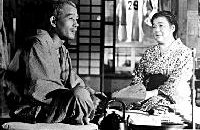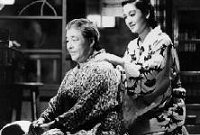
 MUST-SEE
MUST-SEE
scr Kogo Noda, Yasujiro Ozu
with Chishu Ryu, Chieko Higashiyama, Setsuko Hara, Haruko Sugimura, So Yamamura, Shiro Osaka, Kyoko Kagawa, Kuniko Miyake, Nobuo Nakamura, Hisao Toake, Eijiro Tono, Zen Murase
release Japan 3.Nov.53;
US 13.Mar.72
reissue UK 16.Jan.04
53/Japan 2h16

Family matters: Ryu and Higashiyama (above), Higashiyama and Hara (below).

 Ozu's masterpiece gets a 50th anniversary release with a spotless, digitally remastered print and a DVD set of his films. So now's the chance to see on the big screen what's arguably the best family drama ever put on film. It's frighteningly contemporary in the way it examines the same themes as films like Ordinary People and American Beauty, for example. And both of those look clumsy and derivative in comparison!
Ozu's masterpiece gets a 50th anniversary release with a spotless, digitally remastered print and a DVD set of his films. So now's the chance to see on the big screen what's arguably the best family drama ever put on film. It's frighteningly contemporary in the way it examines the same themes as films like Ordinary People and American Beauty, for example. And both of those look clumsy and derivative in comparison!

In their mid-60s, Shukishi and Tomi (Ryu and Higashiyama) are enjoying their quiet life in a rural village that was untouched by the war. Their youngest daughter (Kagawa) still lives at home, but the other children have moved away, so they decide to take a trip to Tokyo to reconnect. Koichi (Yamamura) is a suburban doctor with a wife (Miyake) and two kids; Shige (Sugimura) is a feisty hairdresser with a gentle husband (Nakamura). But their lives are far too busy, so they pawn their parents off on Noriko (Hara), the young widow of another son who died in the war, and then send them to a coastal resort for "relaxation". Bored, they decide to go home, stopping in Osaka to visit another son (Osaka) on the way. But Tomi falls ill, and the whole family is called back home in case the unthinkable happens.
Filmed with static shots, knee-high camera angles and astonishing juxtaposition of the characters within the frame, Ozu's imagery is only dated by the technical quality of the black and white film stock. What's on screen is shockingly complex and raw--funny, touching, repressed, uncomfortably truthful and movingly emotional. We get to know these characters so profoundly that they are unforgettable--we see them both within ourselves and in our family. These are self-absorbed people who aren't all bad, and the moments of real love and compassion come in completely unexpected places.
Meanwhile Ozu brilliantly, almost incidentally, captures the stark divisions between the pre-war and post-war world--old versus new ideas, clothes, values, lifestyles, expectations. This gives the intimate central story a stunningly meaningful backdrop. It isn't merely a fable about progress, but about how we pay for it in our personal lives. Yes, it's a movie made in 1953 Japan, and it does have a foreign, somewhat stagy feel for Western audiences. But it's so vivid and telling that after a few minutes we are completely and utterly gripped. A true classic.
 |
themes | 4.Dec.03 |

 herick Xenxus, Philippines, Davao:
herick Xenxus, Philippines, Davao:  "The theme of the story revolves around the biases of people treating their relatives. Such is a bias in a sense that the people treat other people particularly their kin with respect to the benefits they can obtain in them. Just like in the film, the elderly couple as they visited their children was confronted with indifference and ingratitude merely because they have nothing to offer anymore than matters." (22.Jan.07)
"The theme of the story revolves around the biases of people treating their relatives. Such is a bias in a sense that the people treat other people particularly their kin with respect to the benefits they can obtain in them. Just like in the film, the elderly couple as they visited their children was confronted with indifference and ingratitude merely because they have nothing to offer anymore than matters." (22.Jan.07)
HOME | REVIEWS | NEWS | FESTIVAL | AWARDS | Q&A | ABOUT | TALKBACK